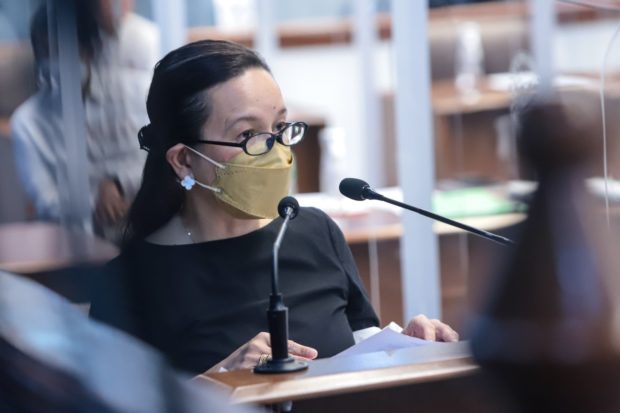Bill aims to remove queues in gov’t offices

Sen. Grace Poe, chairperson of the Committee on Public Services. PRIB file photo / Bibo Nueva España
MANILA, Philippines — Sen. Grace Poe has filed a bill that seeks to set up online transactions in government offices to get rid of long lines.
Senate Bill No. 334 or the proposed E-Government Act of 2022 seeks to mandate government agencies on the efficient delivery of services, allowing the public to perform transactions through their mobile phones or desktop computers.
“Filipinos certainly deserve the convenience of accessing government services and information at their fingertips. Amid the new normal, swift and reliable access to state and local institutions anytime, anywhere is more crucial than ever,” Poe said.
E-gov’t master plan
Under the proposed bill, the public can apply for claims or loans, pay taxes, renew licenses and engage in related government transactions without having to leave their houses or offices.
“Waiting in line for hours for cash aid, loans, benefits and the like should be a thing of the past. We must spare our people, especially the elderly and persons with disability, from this unacceptable strain in the hands of the government,” Poe said.
Article continues after this advertisementSB 334 tasks the Department of Information and Communications Technology (DICT) to establish and promote an e-government master plan (EGMP) to serve as a framework for the rollout of online services by agencies.
Article continues after this advertisementThe DICT secretary will head the e-government initiative while each local government unit (LGU) will have an information officer to supervise the adoption of the master plan and report compliance.
The EGMP will deal with archives and records management system, online payment system, citizen front-line delivery services, and public finance management and procurement system.
The bill also provides for the review and revision of the master plan every three years.
The EGMP was first crafted under Executive Order No. 47, issued by then President Benigno Aquino III in 2011, which directed the then Information and Communications and Technology Office to provide an ICT infrastructure, systems and resources to support “efficient, effective, transparent and accountable governance.”
According to Poe, her bill aims to continue government efforts to “harmonize and integrate ICT” in the implementation of the master plan, which was first implemented from 2013 to 2016.
Another six-year EGMP was released for 2016 to 2022, which the DICT updated this year, she said.
For Poe, the digital transformation of processes involved in delivering services was more urgent now with physical interaction still limited due to COVID-19, making reliable access to government services “within the confines of our homes… more crucial than ever.” Over the years, several bills were approved to make business transactions more convenient for the public, including Republic Act No. 11032 or the Ease of Doing Business and Efficient Government Service Delivery Act of 2018.
Signed on May 28, 2018, it was part of the Duterte administration’s 10-point socioeconomic agenda to increase competitiveness and the ease of doing business in the country.
It sought to reduce the processing times of business transactions in government agencies and government-owned and -controlled corporations to three working days for simple transactions, seven days for complex transactions, and 20 working days for highly technical transactions.
RA 11032 also required all LGUs to come up with a unified business application form to streamline procedures for the issuance of business permits, clearance and other types of authorizations.
At the same time, LGUs were mandated to set up one-stop shops to facilitate business permits applications.
—WITH A REPORT FROM INQUIRER RESEARCH
RELATED STORIES
Public servants should ‘always feel guilty’ about traffic, long lines — MMDA official
Senior citizens suffer in long lines